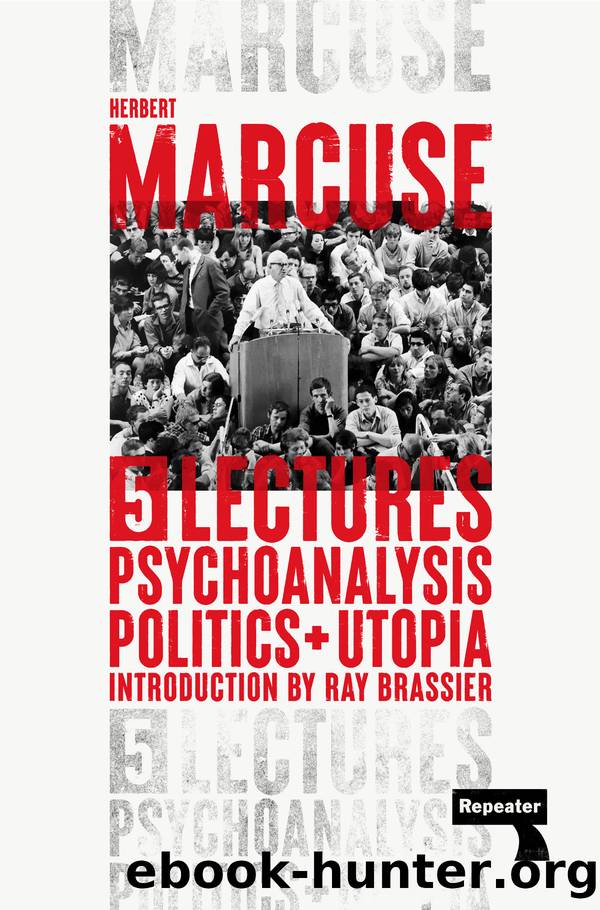Psychoanalysis, Politics, and Utopia by Herbert Marcuse

Author:Herbert Marcuse [Marcuse, Herbert]
Language: eng
Format: epub
ISBN: 9781914420412
Publisher: Watkins Media
Published: 2022-09-15T05:00:00+00:00
1. The sweeping changes in advanced industrial society are accompanied by equally basic changes in the primary mental structure. In the society at large, technical progress and the global coexistence of opposed social systems lead to an obsolescence of the role and autonomy of the economic and political subject. The result is ego formation in and by masses, which depend on the objective, reified leadership of the technical and political administration. In the mental structure, this process is supported by the decline of the father image, the separation of the ego ideal from the ego and its transference to a collective ideal, and a mode of desublimation which intensifies social control of libidinal energy.
2. Shrinkage of the ego, and collectivization of the ego ideal signify a regression to primitive stages of the development, where the accumulated aggression had to be âcompensatedâ by periodic transgression. At the present stage, such socially sanctioned transgression seems to be replaced by the normalized social and political use of aggressive energy in the state of permanent preparedness.
3. In spite of its perfectly rational justification in terms of technology and international politics, the activation of surplus aggressive energy releases compulsive forces which threaten to undermine the established political institutions. The sanctioning of aggressive energy demanded in the prevailing situation makes for a growth of popular extremism in the masses â a rise of irrational forces which confront the leadership with their claims for satisfaction.
4. By virtue of this constellation, the masses determine continuously the policy of the leadership on which they depend, while the leadership sustains and increases its power in response and reaction to the dependent masses. The formation and mobilization of masses engenders authoritarian rule in democratic form. This is the familiar plebiscitarian trend â Freud has uncovered its compulsive roots in the advance of civilization.
5. These are regressive tendencies. The masses are not identical with the âpeopleâ on whose sovereign rationality the free society was to be established. Today, the chance of freedom depends to a great extent on the power and willingness to oppose mass opinion, to assert unpopular policies, to alter the direction of progress. Psychoanalysis cannot offer political alternatives, but it can contribute to the restoration of private autonomy and rationality. The politics of mass society begin at home, with the shrinking of the ego and its subjection to the collective ideal. Counteracting this trend may also begin at home: psychoanalysis may help the patient to live with a conscience of his own and with his own ego ideal, which may well mean â to live in refusal and opposition to the Establishment.
Thus, psychoanalysis draws its strength from its obsolescence: from its insistence on individual needs and individual potentialities which have become outdated in the social and political development. That which is obsolete is not, by this token, false. If the advancing industrial society and its politics have invalidated the Freudian model of the individual and his relation to society, if they have undermined the power of the ego to
Download
This site does not store any files on its server. We only index and link to content provided by other sites. Please contact the content providers to delete copyright contents if any and email us, we'll remove relevant links or contents immediately.
The Art of Thinking Clearly by Rolf Dobelli(10489)
The 5 Love Languages: The Secret to Love That Lasts by Gary Chapman(9815)
Mindhunter: Inside the FBI's Elite Serial Crime Unit by John E. Douglas & Mark Olshaker(9343)
Becoming Supernatural by Dr. Joe Dispenza(8217)
Nudge - Improving Decisions about Health, Wealth, and Happiness by Thaler Sunstein(7707)
The Road Less Traveled by M. Scott Peck(7603)
Mastermind: How to Think Like Sherlock Holmes by Maria Konnikova(7347)
Enlightenment Now: The Case for Reason, Science, Humanism, and Progress by Steven Pinker(7313)
Win Bigly by Scott Adams(7198)
The Way of Zen by Alan W. Watts(6614)
Factfulness: Ten Reasons We're Wrong About the World – and Why Things Are Better Than You Think by Hans Rosling(4742)
The State of Affairs by Esther Perel(4721)
Gerald's Game by Stephen King(4654)
Man's Search for Meaning by Viktor Frankl(4606)
The Confidence Code by Katty Kay(4260)
Thinking in Bets by Annie Duke(4227)
The Healing Self by Deepak Chopra(3579)
Hidden Persuasion: 33 psychological influence techniques in advertising by Marc Andrews & Matthijs van Leeuwen & Rick van Baaren(3565)
The Worm at the Core by Sheldon Solomon(3487)
